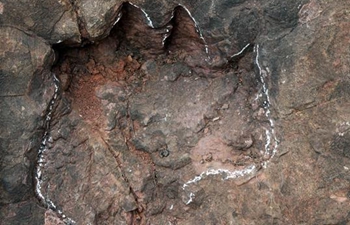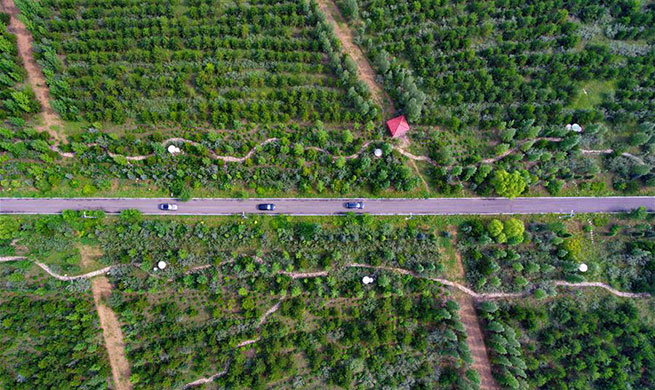by Xinhua writer Chu Yi
KUNMING, Aug. 10 (Xinhua) -- Three years ago, a baby elephant was abandoned by her herd at the doorway of a farmer's house in Simao, southwest China's Yunnan province, just days after birth.
The elephant was found by an elderly woman who gave her water and contacted the local wildlife rescue station. Veterinarians from Asian Elephant Breeding and Rescue Center in Xishuangbanna National Nature Reserve came and took the animal to their center for treatment. She was found to have an irregular heartbeat, umbilical cord infection, and a large lump about the size of a goose egg.
SAVING THE DYING
"She weighed about 76 kilograms at that time, much smaller than the average weight of a newborn elephant at about 100 kg. She could hardly support her body," said Bao Mingwei, a vet with the center.
As the elephant was born in the Chinese lunar Year of the Goat, she was given the name Yang Niu, which is made up of the Chinese characters for goat and sex --"little girl."
Yang Niu was malnourished due to a lack of breast milk and was also at risk for septicemia, also known as blood poisoning.
Vets decided to feed the rescued animal goat milk as it was easy to obtain and has the most similar composition to that of elephant milk.
"Upon hearing the news, locals voluntarily sent their goats to the center," Bao said.
Simao, where the elephant was found, is 200 kilometers from the center in Xishuangbanna. The donated goats arrived much earlier than the elephant, according to the center.
"She suffered from complicated health problems, but we were unable to give her medicine as a newborn," Bao said. "Many vets didn't expect that she would survive."
According to Bao, wild elephants often leave sick herd members near villages on purpose, counting on humans to save them.
"We didn't want to let them down," Bao said.
To save Yang Niu, the center sought support from elephant experts in Thailand. Two Thai vets came to Xishuangbanna for group consultations and worked out detailed therapeutic plans.
During the week Yang Niu was rescued, veterinarians and carers didn't leave her side. They slept with her, fed her every one to two hours, and took care of her around the clock.
"When she cried or licked us, we knew it was her way of expressing hunger," said Chen Jiming, a keeper at the center.
Chen was the first person Yang Niu saw after waking up from the coma.
Since 2008, the center has rescued 13 wild elephants. Each has at least two carers called "elephant parents." They work in shifts accompanying the animals around the clock, monitoring their excrement and health and training them for release into the wild.
"We slept on bunk beds beside Yang Niu when she was supposed to sleep straw mattress. At first, she was too weak to move, but later as she recovered, she got more energetic and even climbed onto the bed trying to sleep with us," Chen said. "One night, while I lay down the elephant slowly walked up to me. She touched my hand and legs with her trunk and gently pushed me aside to make room for her to sleep beside me."
Later, the carers began to sleep on the upper bunk but would always find the elephant on the lower bunk in the morning.
Concerned about her health, Yang Niu's four carers slept near her for a whole year before moving to the room next door.
At first, the elephant was not used to sleeping alone. "When we heard the noises or cries she made, we would go to pat and comfort her until she calmed down and fell asleep," Chen said.
The small animal was loved by everyone at the center. She now weighs more than 700 kg and has grown into a lively adolescent. Yang Niu will celebrate her third birthday Sunday, the World Elephant Day.
Xishuangbanna is one of the main habitats for wild Asian elephants in China.
The animals are under Class-A protection in China and are classified as endangered on the International Union for Conservation of Nature (IUCN) Red List of Threatened Species.
"Enhanced protection for wild animals has led to a rise in the elephant population in recent years," Bao said. "In the 1990s, there were only about 180 wild Asian elephants living in Yunnan."
It is estimated that the population has risen to around 300. In March, a herd of 50 elephants was spotted in the Wild Elephant Valley in Xishuangbanna.
The 340-hectare valley is a scenic area where wild elephants often roam. It was opened in 1990 at a cost of 150 million yuan (about 23.5 million U.S. dollars).
In 2008, a breeding and rescue center was established there. So far, five elephants have been born at the center.
TRAINING FOR RELEASE
With an ultimate goal of returning these animals to the wild, the carers take the elephants to the mountains from 8:30 a.m. to 4 p.m. every day. During that time, older elephants teach younger ones to eat about 140 kinds of wild plants.
One day after training in the mountains, Yang Niu followed her carer home. Continuous rainfall had made the road slippery. To balance, Yang Niu stretched her forelegs, put her belly on the ground and slid down the hill.
Her carer recorded it and posted the video online, where it received more than 33 million views on Douyin, a popular short-video apps.
"Yang Niu is like our daughter. She is a princess. If she becomes an online celebrity it is a good thing as it can help raise public interest in wild elephants. After all, their protection relies on the whole of society," said Chen, the carer.

















